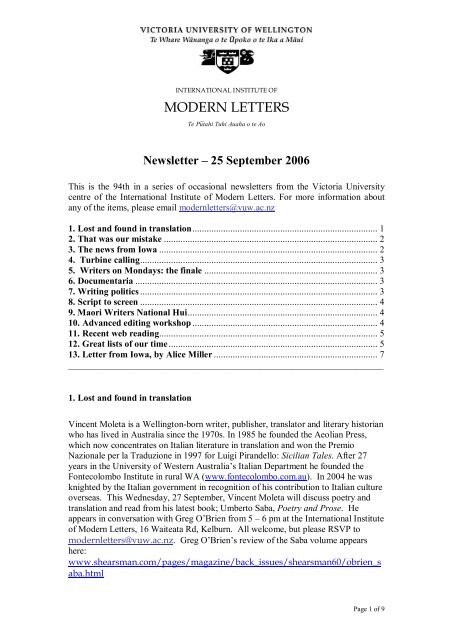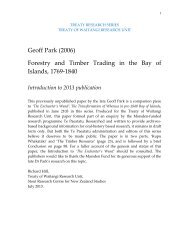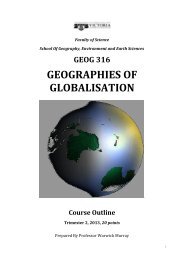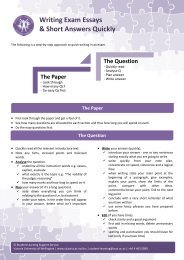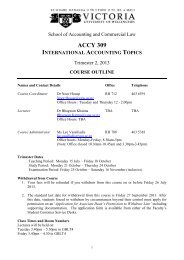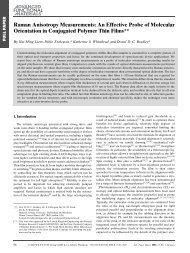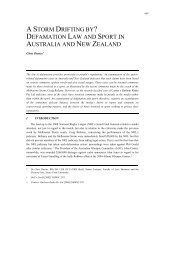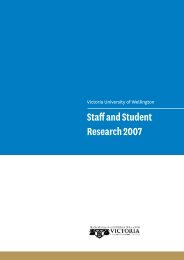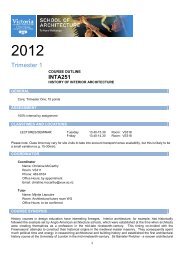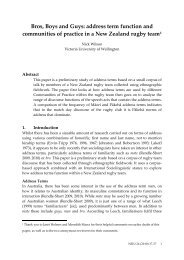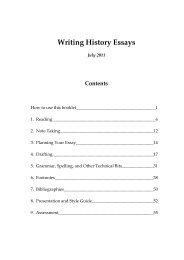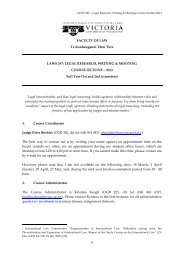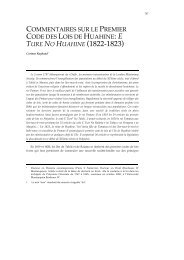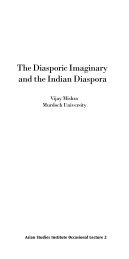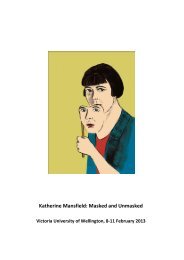MODERN LETTERS - Victoria University of Wellington
MODERN LETTERS - Victoria University of Wellington
MODERN LETTERS - Victoria University of Wellington
Create successful ePaper yourself
Turn your PDF publications into a flip-book with our unique Google optimized e-Paper software.
INTERNATIONAL INSTITUTE OF<br />
<strong>MODERN</strong> <strong>LETTERS</strong><br />
Te P¯ utahi Tuhi Auaha o te Ao<br />
Newsletter – 25 September 2006<br />
This is the 94th in a series <strong>of</strong> occasional newsletters from the <strong>Victoria</strong> <strong>University</strong><br />
centre <strong>of</strong> the International Institute <strong>of</strong> Modern Letters. For more information about<br />
any <strong>of</strong> the items, please email modernletters@vuw.ac.nz<br />
1. Lost and found in translation.............................................................................. 1<br />
2. That was our mistake .......................................................................................... 2<br />
3. The news from Iowa ............................................................................................ 2<br />
4. Turbine calling.................................................................................................... 3<br />
5. Writers on Mondays: the finale ......................................................................... 3<br />
6. Documentaria ...................................................................................................... 3<br />
7. Writing politics .................................................................................................... 3<br />
8. Script to screen .................................................................................................... 4<br />
9. Maori Writers National Hui................................................................................ 4<br />
10. Advanced editing workshop .............................................................................. 4<br />
11. Recent web reading............................................................................................ 5<br />
12. Great lists <strong>of</strong> our time........................................................................................ 5<br />
13. Letter from Iowa, by Alice Miller ..................................................................... 7<br />
_____________________________________________________________________<br />
1. Lost and found in translation<br />
Vincent Moleta is a <strong>Wellington</strong>born writer, publisher, translator and literary historian<br />
who has lived in Australia since the 1970s. In 1985 he founded the Aeolian Press,<br />
which now concentrates on Italian literature in translation and won the Premio<br />
Nazionale per la Traduzione in 1997 for Luigi Pirandello: Sicilian Tales. After 27<br />
years in the <strong>University</strong> <strong>of</strong> Western Australia’s Italian Department he founded the<br />
Fontecolombo Institute in rural WA (www.fontecolombo.com.au). In 2004 he was<br />
knighted by the Italian government in recognition <strong>of</strong> his contribution to Italian culture<br />
overseas. This Wednesday, 27 September, Vincent Moleta will discuss poetry and<br />
translation and read from his latest book; Umberto Saba, Poetry and Prose. He<br />
appears in conversation with Greg O’Brien from 5 – 6 pm at the International Institute<br />
<strong>of</strong> Modern Letters, 16 Waiteata Rd, Kelburn. All welcome, but please RSVP to<br />
modernletters@vuw.ac.nz. Greg O’Brien’s review <strong>of</strong> the Saba volume appears<br />
here:<br />
www.shearsman.com/pages/magazine/back_issues/shearsman60/obrien_s<br />
aba.html<br />
Page 1 <strong>of</strong> 9
2. That was our mistake<br />
Readers may recall our puzzlement (in the last newsletter) at the fact that the<br />
September issue <strong>of</strong> North & South listed itself as having won the award for best<br />
magazine book review pages in the 2006 Montana Book Awards. In fact the claim<br />
was legitimate although the Dominion Post was overall winner <strong>of</strong> the award for Best<br />
Review Pages, North & South took the magazine subcategory, one <strong>of</strong> eight(!)<br />
subcategories in the newlook reviewing awards. Our apologies to North & South.<br />
3. The news from Iowa<br />
2005 MA graduate Alice Miller has settled into the Iowa Writers’ Workshop, where<br />
she seems to be taking maximum advantage <strong>of</strong> the courses <strong>of</strong>fered by its high<br />
powered faculty. She writes:<br />
‘I have Brenda Hillman for my poetry workshop. She encourages us to revise our<br />
poems obsessively. She urges us to consider what attracts us to particular words,<br />
lines, or phrases, and asks us to consider every aspect our poems scrupulously, down<br />
to the last scrap <strong>of</strong> punctuation. Many people here talk about how crucial it is to take<br />
risks in your poetry – take risks, and be prepared for them to backfire.<br />
‘Each week a packet <strong>of</strong> every class’s poems comes out, and we all get carried away<br />
with our red pens. Despite various rumours that the workshop is extremely<br />
competitive, our class tends to be constructive and supportive. Brenda claims to run<br />
an ‘antiworkshop workshop’, discouraging competitiveness and ego, and she seems<br />
to be pretty effective.<br />
‘We also take seminars here, and because I’m not working, I’ve gone a little<br />
overboard with these. There are too many marvellous options, and I figure that I’d<br />
best make the most <strong>of</strong> them! My first seminar is with Robert Hass, who visited New<br />
Zealand earlier this year…’<br />
Alice’s letter from Iowa appears in full as the last item in this newsletter.<br />
The IIML is also <strong>of</strong>fering a taste <strong>of</strong> the Iowa experience in <strong>Wellington</strong> this summer<br />
with workshops in fiction and poetry convened by US novelist Curtis Sittenfeld and<br />
poet Zach Savich. The deadline for applications is 10 November, and course<br />
information and an application form are available from the IIML, ph (04) 463 6854,<br />
fax (04) 463 6865, email modernletters@vuw.ac.nz or see<br />
www.vuw.ac.nz/modernletters/documents/CREW256Iowa_summer06.pdf.<br />
Page 2 <strong>of</strong> 9
4. Turbine calling<br />
A reminder that we are still considering prose and poetry by emerging and established<br />
writers for the annual edition <strong>of</strong> Turbine, the online journal <strong>of</strong> the IIML. The deadline<br />
for submissions is 21 October; for submission guidelines, and to view back issues <strong>of</strong><br />
the journal, go to: http://www.vuw.ac.nz/turbine/.<br />
5. Writers on Mondays: the finale<br />
Following a month <strong>of</strong> great audiences for the thirty writers completing the MA in<br />
Creative Writing at <strong>Victoria</strong> <strong>University</strong>, our 2006 series <strong>of</strong> events at City Gallery<br />
draws to a close next Monday with a visit from two Australian writers, the reviewer,<br />
arts broadcaster, poet and novelist Cath Kenneally and poet Ken Bolton. It’s been a<br />
lively and varied season, and we’re grateful to City Gallery for providing a congenial<br />
space in which writers can connect with audiences. Bolton & Kenneally will appear in<br />
conversation with Greg O’Brien, and the event takes place, as usual, from 12 pm.<br />
Admission is free, all welcome.<br />
You can sample work by and read a long interview with Ken Bolton at:<br />
http://www.austlit.com/a/boltonk/index.html.<br />
Cath Kenneally’s novel Room Temperature is a portrait <strong>of</strong> a working class girlhood in<br />
beachside Adelaide, through hippiedom and harshness in Tasmania, through the birth<br />
and development <strong>of</strong> children, to the struggle <strong>of</strong> breaking free from a violent partner.<br />
Australian Bookseller called this ‘a sensitive and thoughprovoking portrayal <strong>of</strong> one<br />
woman's escape from an inherited legacy <strong>of</strong> domestic violence.’ Some poems by Cath<br />
Kenneally can be found here:<br />
http://www.eaf.asn.au/otis/cktp.html.<br />
6. Documentaria<br />
The DOCNZ Documentary Film Festival opens today in <strong>Wellington</strong> (25 Sept – 4<br />
Oct), then moves on to Christchurch (1215 Oct) and Dunedin (2629 Oct). For full<br />
programme listings see www.docnz.org.nz/.<br />
7. Writing politics<br />
The <strong>Wellington</strong> Branch <strong>of</strong> the New Zealand Society <strong>of</strong> Authors is inviting<br />
pr<strong>of</strong>essional writers to a panel discussion between spokespeople on the arts from all<br />
sides <strong>of</strong> the House. The discussion will focus on issues affecting the pr<strong>of</strong>essional lives<br />
<strong>of</strong> New Zealand writers. Representatives <strong>of</strong> most <strong>of</strong> the parties represented in<br />
Parliament will address issues raised by writers and writers’ organizations at Turnbull<br />
Page 3 <strong>of</strong> 9
House, 11 Bowen Street, <strong>Wellington</strong> on Tuesday, 3 October from 7.30 pm Writers<br />
interested in attending are asked to notify Kevin Cudby, <strong>of</strong> the NZSA <strong>Wellington</strong><br />
Branch committee. Ph (04) 938 1103 or email msg@kevincudby.com. Entry costs $3<br />
for NZSA members or $5 for nonmembers to cover refreshments. And if you have a<br />
burning question you’d like addressed, send it to director@nzauthors.org.nz.<br />
8. Script to screen<br />
Script to Screen invites writers <strong>of</strong> feature film scripts to apply for one <strong>of</strong> a series <strong>of</strong><br />
writerfocused Script ReadThrough Workshops with pr<strong>of</strong>essional actors to be held in<br />
2007. Closing date for submissions is 5pm Friday, October 6th 2006. The script read<br />
through sessions <strong>of</strong>fer screenwriters a forum for the discussion and analysis <strong>of</strong><br />
working drafts. Each workshop will be dedicated to a single project and will be held<br />
in a closed environment. For more information and application details, contact<br />
Rebecca Kunin at Script to Screen on (09) 360 5400, or rebecca@scriptto<br />
screen.co.nz.<br />
9. Maori Writers National Hui<br />
The 2006 Maori Writers National Hui aims to give a global perspective on the<br />
industry and opportunities for Maori writers. Maori writers working in all areas <strong>of</strong><br />
literature and the writing industry will gather together in <strong>Wellington</strong> on 6 – 8 October<br />
to attend the hui, which features keynote speeches from Witi Ihimaera, Bill Manhire,<br />
Hirini Moko Mead and others. There are workshops in fiction, film, performance,<br />
lyric writing, and storytelling, and publishers’ forums will see representatives from<br />
New Zealand publishing houses bring their advice and commentary to the table.<br />
Evening functions are open to the public and will feature top Maori writers and<br />
musicians. The hui takes place at the Mercure Hotel, <strong>Wellington</strong> from 68 October<br />
2006.<br />
Registration forms for writers are available from www.maoriart.org.nz and evening<br />
functions cost $10. To register or purchase tickets, contact Kylie Tiuka at Toi Maori<br />
Aotearoa. Phone: 04 801 7914. Email: events@maoriart.org.nz.<br />
10. Advanced editing workshop<br />
The Local Publishers’ Forum <strong>Wellington</strong> is <strong>of</strong>fering a oneday course for editors with<br />
experienced editor Anna Rogers. Anna will cover a wide range <strong>of</strong> topics such as the<br />
role <strong>of</strong> the editor, editing nonfiction (and a little on fiction), common errors and<br />
pitfalls, handling 'isms' (sexism, racism etc), treatment <strong>of</strong> the author, blurbwriting,<br />
etc. There will be handson editing exercises and examples, but also plenty <strong>of</strong> time<br />
for questions and debate. The course will be held either on Tuesday 31 October or<br />
Wednesday 1 November from 9am–4pm at Turnbull House, Bowen Street,<br />
<strong>Wellington</strong>. The course fee is $120 waged $90 unwaged. To register, contact Peter<br />
Dorn, email peterd@astra.co.nz or tel (04) 4990544.<br />
Page 4 <strong>of</strong> 9
11. Recent web reading<br />
Shuker online<br />
http://www.lumiere.net.nz/reader/arts.php<br />
http://myspace.com/carlshuker<br />
http://blog.myspace.com/index.cfm?fuseaction=blog.view&friendID=104638<br />
422&blogID=167482882&MyToken=93bc51c251a9450fbab517ef1e90439b<br />
Scary advertising<br />
http://www.mum.org/Lysol48.htm<br />
Questions for poetry<br />
http://garysullivan.blogspot.com/2006/07/questionsforpoetryhowcan<br />
poetry.html<br />
When Bill & Nigel went west<br />
http://nzbookmonth.co.nz/blogs/latest_news/archive/2006/09/15/372.asp<br />
x<br />
The oddest English spellings<br />
http://blog.oup.com/oupblog/2006/09/it_is_easy_to_g.html#more<br />
The Emily Dickinson Random Epigraph Machine<br />
http://www.logopoeia.com/ed/<br />
True life misery<br />
http://books.guardian.co.uk/comment/story/0,,1877502,00.html<br />
Tyrant Ted?<br />
http://news.scotsman.com/entertainment.cfm?id=1336682006<br />
12. Great lists <strong>of</strong> our time<br />
All the plants <strong>of</strong> the Bible:<br />
Acacia<br />
Almond<br />
Aloe<br />
Apple<br />
Balm <strong>of</strong> Gilead<br />
Barley<br />
Bean<br />
Black cumin<br />
Blight or blasting<br />
Bramble<br />
Broom<br />
Page 5 <strong>of</strong> 9
Calamus<br />
Cane<br />
Caper<br />
Carob<br />
Cassia, cinnamon<br />
Cattail<br />
Cedar<br />
Coriander<br />
Cotton<br />
Cumin<br />
Cypress<br />
Dill<br />
Dove's dung<br />
Ebony<br />
Fig<br />
Flax<br />
Flowers <strong>of</strong> the field<br />
Frankincense<br />
Galbanum<br />
Gall<br />
Garlic<br />
Gourd<br />
Grape<br />
Gum resin<br />
Gum tragacanth<br />
Henna<br />
Hyssop<br />
Laudanum<br />
Laurel<br />
Leeks<br />
Lentil<br />
Lign aloes or aloe wood<br />
Lily <strong>of</strong> the field<br />
Lily <strong>of</strong> the valley (Various)<br />
Mandrake<br />
Melon<br />
Millet<br />
Mildew (Various fungi)<br />
Mint<br />
Mustard<br />
Myrrh<br />
Myrtle<br />
Nettles<br />
Oak<br />
Olive<br />
Onion<br />
Palm<br />
Papyrus<br />
Pines<br />
Pistachio<br />
Page 6 <strong>of</strong> 9
Plane tree<br />
Pomegranate<br />
Poplars<br />
Reed<br />
Rose <strong>of</strong> Sharon<br />
Rue<br />
Rush<br />
Saffron<br />
Sorghum<br />
Spikenard<br />
Stone pine<br />
Styrax<br />
Sycamore fig<br />
Tamarisk<br />
Tares<br />
Terebinth<br />
Thistle<br />
Thorn<br />
Thyine<br />
Tumbleweed<br />
Walnut<br />
Wheat<br />
Willow<br />
Wormwood<br />
Yeast<br />
This list courtesy <strong>of</strong> Old Dominion <strong>University</strong>... and listlady Cath Vidler.<br />
http://web.odu.edu/webroot/instr/sci/plant.nsf/pages/allbibleplantslist<br />
13. Letter from Iowa, by Alice Miller<br />
Last week some friends and I drove out <strong>of</strong> the city to a corn maze. This was my first<br />
truly Iowan experience, bushwhacking through the corn in the last gasps <strong>of</strong> summer<br />
humidity. The bushwhacking was our own improvised addition to the maze – it all<br />
seemed entirely appropriate given our already curious experience <strong>of</strong> the Midwest.<br />
All my other adventures have occurred within Iowa City, in and around the Writers’<br />
Workshop. The Workshop consists <strong>of</strong> a hundred writers, evenly split between fiction<br />
and poetry. The students come from all over the US – California, New York,<br />
Georgia, Louisiana, Virginia, New Jersey. I don’t think I’ve properly met a genuine<br />
Iowan for the six weeks that I’ve been here. (I did, however, briefly run into a rugby<br />
player from Porirua).<br />
For some <strong>of</strong> the people here it’s the first time they’ve been surrounded by writers, and<br />
there’s no shortage <strong>of</strong> excited, inspired talk – many wonderful ideas merging and<br />
colliding. Lots <strong>of</strong> the poets share a love for the same writers (O’Hara, Ashbery,<br />
Dickinson, Stevens), and there are always new recommendations for reading.<br />
Sometimes, impassioned exclamations <strong>of</strong> ‘you must read this!’ lead to you finding<br />
Page 7 <strong>of</strong> 9
that book in your pigeonhole the next day. There’s a pretty incessant – and<br />
sometimes rather relentless – social scene here, and too many readings and parties for<br />
me to attend all <strong>of</strong> them in good conscience!<br />
The city is a lot prettier than I expected; every street is framed by large, leafy trees,<br />
which are now starting to turn crunchy. The humidity is slowly phasing out, leaving a<br />
slightly chillier, overcast autumn. Iowa City’s a liberal student town, with an<br />
overwhelming student population, and an abundance <strong>of</strong> bars and cafes. And it’s a<br />
creative place. Zadie Smith was here a couple <strong>of</strong> weeks ago, and listening to her talk<br />
about what she loves about reading – the potential to inhabit other worlds and ways <strong>of</strong><br />
thinking – made me want to lock my door and curl up with a stack <strong>of</strong> novels.<br />
I have Brenda Hillman for my poetry workshop. She encourages us to revise our<br />
poems obsessively. She urges us to consider what attracts us to particular words,<br />
lines, or phrases, and asks us to consider every aspect our poems scrupulously, down<br />
to the last scrap <strong>of</strong> punctuation. Many people here talk about how crucial it is to take<br />
risks in your poetry – take risks, and be prepared for them to backfire.<br />
Each week a packet <strong>of</strong> every class’s poems comes out, and we all get carried away<br />
with our red pens. Despite various rumors that the workshop is extremely<br />
competitive, our class tends to be constructive and supportive. Brenda claims to run<br />
an ‘antiworkshop workshop’, discouraging competitiveness and ego, and she seems<br />
to be pretty effective.<br />
We also take seminars here, and because I’m not working, I’ve gone a little overboard<br />
with these. There are too many marvelous options, and I figure that I’d best make the<br />
most <strong>of</strong> them! My first seminar is with Robert Hass, who visited New Zealand earlier<br />
this year. He is married to Brenda Hillman; they’re both visiting faculty at Iowa this<br />
semester. His seminar is on the ‘longish’ poem. It’s a wonderful class, and involves<br />
Bob waxing lyrical on issues <strong>of</strong> art and mortality through the work and lives <strong>of</strong><br />
Whitman, Rilke, Pound, Eliot, Neruda, and others.<br />
Then there are the other workshop seminars. I’m taking Jim Galvin’s class on James<br />
Wright and James Merrill, which looks at the similarities between these two very<br />
different writers. Galvin is a unique and rather remarkable teacher, and I’m now far<br />
more appreciative <strong>of</strong> some <strong>of</strong> Wright’s poems than I was previously. I’m also taking<br />
a class with Cole Swenson on ekphrasis, which aims to help us generate work by<br />
exposing us to a variety <strong>of</strong> artistic inspiration – galleries, theatre, dance, film – and<br />
discussing our writing process. This proves useful in the slightly artificial scenario<br />
we find ourselves in, expected to generate poems on a weekly or fortnightly basis.<br />
Finally, I’m also taking a translation workshop in the International Writing Program.<br />
The program brings writers from all over the world to write and translate their works<br />
into English. As students, not only do we meet many amazing international writers,<br />
but we get to trudge through the fascinating, fraught process <strong>of</strong> sidebyside<br />
translation with some <strong>of</strong> them. I’m going to be working with an Albanian poet and a<br />
Bangladeshi short story writer.<br />
There are two typical responses from people here when I say I’m from New Zealand.<br />
One is ‘I hear it’s so pretty there,’ and the other is ‘oh, Lord <strong>of</strong> the Rings!’ Often one<br />
Page 8 <strong>of</strong> 9
<strong>of</strong> these follows the other. I’m also sometimes asked whether I’m deeply homesick<br />
because Iowa has no kangaroos. Some friends <strong>of</strong> mine here have discovered that the<br />
sentence: ‘the ducks parked in the dark <strong>of</strong> the yard’, is particularly useful to<br />
demonstrate the ridiculousness <strong>of</strong> the New Zealand accent. I think I’m the only<br />
international student in the workshop, so I’m a pretty easy target. Actually, I’m<br />
fortunate that there’s a New Zealand writer, James Norcliffe, visiting in the<br />
International Writing Program. He’s a useful port <strong>of</strong> call when I’m despairing about<br />
American mall culture, or when I feel like my ‘R’s might be getting too pronounced.<br />
The culture shock has been slight, but occasionally I notice we’re a long way from<br />
New Zealand, and particularly the mountains and ocean. On our way to the corn<br />
maze, we took a wrong turn and found ourselves driving through cornfield after<br />
cornfield – an excess <strong>of</strong> flat land and a sea <strong>of</strong> corn. On the margins <strong>of</strong> this little town<br />
brimming with writers, there are glimmers <strong>of</strong> the sort <strong>of</strong> Iowa you might expect.<br />
Page 9 <strong>of</strong> 9


